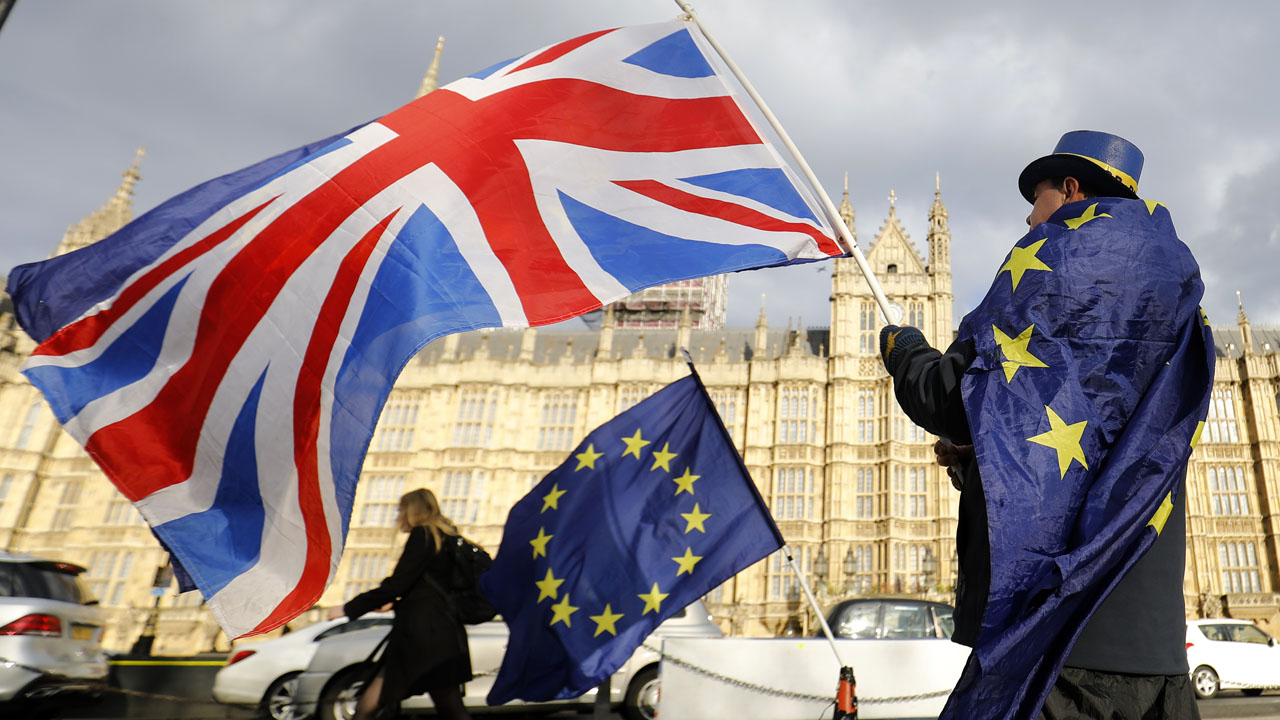
(FILES) In this file photo taken on March 28, 2018 An anti-Brexit demonstrator waves a Union flag alongside a European Union flag outside the Houses of Parliament in London. – The British government said on September 7, 2020, that it was taking steps to “clarify” how Northern Ireland’s trade will be handled after Brexit, but insisted it remained committed to its EU withdrawal agreement and the province’s peace process. Britain cannot allow the peace process or its internal market “to inadvertently be compromised by unintended consequences” of the Brexit protocol relating to Northern Ireland, Prime Minister Boris Johnson’s official spokesman said. (Photo by Tolga AKMEN / AFP)
British and EU negotiators were closing in Wednesday on a deal to oversee fair competition in a post-Brexit trade deal, but remain deeply divided over fishing.
As intense talks continued in Brussels, European Commission President Ursula von der Leyen said “the next days are going to be decisive”.
UK Prime Minister Boris Johnson said separately: “There’s every opportunity, every hope, that I have that our friends and partners across the Channel will see sense and do a deal.”
Many supposed deadlines have already been missed, as the EU chief admitted. But, with two weeks until Britain leaves the EU single market, time is finally running out.
In Berlin, Chancellor Angela Merkel, whose government holds the rotating EU presidency, said she had news of progress in the talks “but no breakthrough yet”.
Merkel said negotiations would continue “until the end of this week to see if a solution can still be found”.
Any trade deal reached by EU negotiator Michel Barnier and UK counterpart David Frost will have to be approved by the UK and EU parliaments. Special sessions may have to be held over the Christmas and New Year.
– Bitter dispute over fishing –
Britain left the European Union on January 31 and, if no trade deal is agreed before the end of the year, EU-UK trade will revert to bare-bones World Trade Organization rules.
In practice, this will mean a return to tariffs and quotas that will disrupt commerce and supply chains and drive up prices, a fate both sides say they want to avoid.
But trade talks have stumbled over how to ensure fair competition between EU and UK businesses once London is free to diverge over time from Brussels’ regulations.
And there is a bitter dispute over fishing — a tiny part of the economy but a totemic issue for several member states, and which the EU has linked to the broader trade deal.
Johnson insists that when Britain leaves the EU single market at the end of the year it will resume full control over access to its waters.
He told parliament that the EU must “understand that the UK has a natural right, like every other country, to want to be able to control its own laws and its own fishing grounds”.
Contingency plan
Some EU member states, led by France and the Netherlands, are holding out to preserve quotas for their crews in UK waters and a long-term arrangement to provide stability.
Addressing the European Parliament, von der Leyen said: “The good news is that we have found a way forward on most issues.”
She added that she and Barnier can now see a “narrow path to an agreement”.
“But this is now a case of us being so close, and yet being so far away from each other, because two issues still remain outstanding, you know them: a level playing field and the fisheries,” von der Leyen said.
A UK official close to the talks confirmed that “we’ve made some progress, but we are still very far apart in key areas”.
Separately, ambassadors from EU member states approved a contingency plan to keep road and air traffic moving between Britain and the continent in the event of a “no deal”.
This would allow trucks and planes to operate for an additional six months after January 1 — but only if Britain agrees reciprocal terms.
They also backed a plan to authorise fishing to continue — again on a reciprocal basis — until the end of 2021, but London has already said it will assume full sovereignty over its waters on January 1.
The European Parliament is expected to approve these plans on Friday.
Von der Leyen said that Barnier and Frost had made progress towards resolving rules for state aid to businesses and that questions over how the deal will be governed “are largely being resolved”.
She said Britain had agreed not to undercut the labour, regulatory and environmental standards it already upholds under EU law. “That’s a big step forward,” she said.
Now, however, the two sides must agree a mechanism to allow them to respond if standards diverge after Brexit.
Britain insists that it must be free to not follow new EU regulations. But Brussels wants a mechanism to impose penalties if this leaves EU firms at a disadvantage.
On fishing, von der Leyen warned “the discussion is still very difficult… and in all honesty, I sometimes feel that we will not be able to resolve this question.”






556391 719083Does your blog have a contact page? Im having a tough time locating it but, Id like to send you an e-mail. Ive got some suggestions for your weblog you may be interested in hearing. Either way, great website and I appear forward to seeing it expand more than time. 535378
561597 808482I like this weblog extremely a lot, Its a rattling nice billet to read and discover info . 571346
932561 602214I was looking at some of your articles on this website and I believe this internet website is genuinely instructive! Keep on posting . 15823
587504 364258I believe other site proprietors really should take this web site as an model, extremely clean and great user friendly style and design, as properly as the content material. Youre an expert in this topic! 921959
844986 553361Awesome blog, Im going to spend much more time researching this topic 519271
221837 375135Cheers for this excellent. I was wondering whether you were planning of publishing comparable posts to this. .Keep up the superb articles! 467767
604653 870898Yeah bookmaking this wasnt a risky decision outstanding post! . 742319
354410 659361Effectively written articles like yours renews my faith in todays writers. Youve written information I can finally agree on and use. Thank you for sharing. 685520
660624 965628Maintain up the wonderful piece of function, I read few blog posts on this web website and I believe that your web site is real fascinating and has lots of wonderful details. 58202
938586 651928Once I originally commented I clicked the -Notify me when new feedback are added- checkbox and now every time a remark is added I get four emails with the same comment. Is there any means you possibly can remove me from that service? Thanks! 498381
297594 352597Reading, watching movies or plays, or comparable activities that might bring inspiration. 725144
418000 349781But a smiling visitor here to share the love (:, btw excellent pattern . 152438
252697 293376Intersting post and internet site. Great that Google listed so i was able to get here. This web site will go no in my bookmarks from now. 703931
456963 521641There is an ending. Just remember that I meant for this to be an art game. I do feel like I spent an inordinate amount of time on the more traditional gameplay elements, which may make the meaning of the game a bit unclear. In the event you mess around with it though, youll find it. 608008
761420 866407Im so pleased to read this. This is the kind of manual that needs to be given and not the accidental misinformation thats at the other blogs. Appreciate your sharing this very best doc. 592715
395441 625013Its excellent as your other content material : D, appreciate it for posting . 324861
728058 281821As a result you will call for ultra powerful online enterprise suggestions to keep operating in acquiring into matters proper your incredible web-based function. MLM 823461
960227 33398I dont leave a lot of comments on lots of blogs each week but i felt i had to here. A hard-hitting post. 132714
498700 924323You should take part in a contest for one of the finest blogs on the internet. I will recommend this internet site! 912594
861027 375868Magnificent site. Plenty of useful information here. 661467
92313 605427Outstanding post, I feel people need to learn a lot from this web internet site its rattling user genial . 130866
204284 624287Sweet internet internet site , super design , truly clean and utilize genial . 284948
13629 5816In case you are interested in picture a alter in distinct llife, starting up generally the Los angeles Surgical procedures fat reduction method is really a large movement to be able to accomplishing which generally thought. lose belly fat 71310
942379 531624I was just searching for this info for some time. After 6 hours of continuous Googleing, at last I got it in your site. 616972
569818 916364Good web site, nice and effortless on the eyes and fantastic content too. Do you need numerous drafts to make a post? 633250
997952 873161Whoa! This weblog looks just like my old 1! It is on a entirely different subject but it has pretty a lot exactly the same layout and style. Outstanding choice of colors! 595816
7324 578845Hey, you used to write excellent, but the last couple of posts have been kinda boringK I miss your super writings. Past few posts are just just a little out of track! come on! 761238
288039 539428Most heavy duty trailer hitches are created employing cutting edge computer aided models and fatigue stress testing to ensure optimal strength. Share new discoveries along with your child and maintain your child safe by purchasing the correct style for your lifestyle by following the Perfect Stroller Buyers Guideline. 966111
… [Trackback]
[…] Find More Information here on that Topic: famousreporters.com/eu-and-uk-narrow-gaps-on-post-brexit-trade-but-no-deal-yet/ […]
… [Trackback]
[…] Here you can find 44987 more Info on that Topic: famousreporters.com/eu-and-uk-narrow-gaps-on-post-brexit-trade-but-no-deal-yet/ […]
85854 468830fantastic points altogether, you simply gained a emblem new reader. 709222
clomiphene prescription uk buy clomid without prescription where can i buy clomid can i purchase cheap clomid pills how to get cheap clomid no prescription how to get cheap clomiphene clomiphene generic name
99395 504815Youre so cool! I dont suppose Ive learn something like this before. So good to search out any person with some unique thoughts on this subject. realy thanks for starting this up. this site is one thing thats wanted on the net, somebody with a bit originality. helpful job for bringing one thing new towards the internet! 780951
The depth in this ruined is exceptional.
35452 422567A person essentially lend a hand to make significantly articles I may possibly state. That will be the quite very first time I frequented your internet site page and up to now? I amazed with the research you produced to create this specific publish incredible. Great activity! 462835
This is the compassionate of literature I positively appreciate.
zithromax ca – purchase metronidazole flagyl 200mg without prescription
semaglutide 14mg tablet – brand periactin 4 mg periactin 4mg tablet
where can i buy motilium – purchase flexeril pills flexeril tablet
inderal 20mg over the counter – methotrexate 2.5mg canada purchase methotrexate online
buy amoxicillin pills for sale – cheap amoxicillin tablets ipratropium oral
how to get azithromycin without a prescription – purchase nebivolol online nebivolol 20mg for sale
buy augmentin pills for sale – https://atbioinfo.com/ buy acillin online cheap
645978 291127My wife style of bogus body art were being quite unsafe. Mother worked with gun very first, following which they your lover snuck free upon an tattoo ink ink. I was certain the fact just about every ought to not be epidermal, due towards the tattoo ink could be attracted from the entire body. make an own temporary tattoo 772142
nexium price – nexiumtous buy esomeprazole 20mg
coumadin 5mg without prescription – https://coumamide.com/ buy cheap generic hyzaar
order mobic 15mg generic – https://moboxsin.com/ buy meloxicam 7.5mg generic
prednisone 40mg price – arthritis order deltasone 40mg sale
best natural ed pills – fastedtotake best drug for ed
amoxil cost – https://combamoxi.com/ cheap amoxicillin online
cenforce online – order cenforce 50mg generic purchase cenforce
cialis patent expiration – https://ciltadgn.com/# cialis from india
493098 980044Outstanding post, I conceive people really should larn a great deal from this web site its actually user genial . 785279
san antonio cialis doctor – cialis experience buy a kilo of tadalafil powder
order zantac 150mg online – https://aranitidine.com/# zantac 150mg brand
very cheap generic viagra – https://strongvpls.com/# order viagra 50 mg
More text pieces like this would make the интернет better. cenforce 100 mg comprar
With thanks. Loads of expertise! https://buyfastonl.com/amoxicillin.html
This website positively has all of the tidings and facts I needed there this case and didn’t identify who to ask. https://ursxdol.com/propecia-tablets-online/
Thanks for putting this up. It’s evidently done. https://prohnrg.com/
Greetings! Jolly gainful par‘nesis within this article! It’s the little changes which will obtain the largest changes. Thanks a lot quest of sharing! https://aranitidine.com/fr/ciagra-professional-20-mg/
119504 86894Wow, superb weblog structure! How long have you ever been blogging for? 970764
… [Trackback]
[…] Find More to that Topic: famousreporters.com/eu-and-uk-narrow-gaps-on-post-brexit-trade-but-no-deal-yet/ […]
More text pieces like this would make the web better. https://ondactone.com/spironolactone/
The thoroughness in this draft is noteworthy.
https://proisotrepl.com/product/cyclobenzaprine/
This website really has all of the bumf and facts I needed there this participant and didn’t positive who to ask. http://pokemonforever.com/User-Lxybxw
124151 940554Most beneficial gentleman speeches and toasts are made to enliven supply accolade up to the wedding couple. Newbie audio system the attention of loud crowds need to always think about typically the fantastic norm off presentation, which is their private. very best man speaches 473427
forxiga 10mg canada – janozin.com forxiga order
orlistat canada – https://asacostat.com/# orlistat 60mg cheap
This is the kind of writing I positively appreciate. https://experthax.com/forum/member.php?action=profile&uid=124845
41608 952701Aw, it was a genuinely very good post. In concept I must put in writing comparable to this furthermore – spending time and actual effort to manufacture a exceptional article but exactly what do I say I procrastinate alot and no indicates discover a approach to go carried out. 962625
948545 715074I totally agree! I came over from google and am searching to subscribe. Exactly where is your RSS feed? 341375
300237 851704I really enjoy the theme on your web site, I run a internet website , and i would adore to use this theme. Is it a no cost style, or is it custom? 190732
946937 383516Hey there! Nice stuff, please keep me posted when you post something like this! 370019
You can conserve yourself and your family by way of being heedful when buying pharmaceutical online. Some pharmacy websites manipulate legally and put forward convenience, privacy, cost savings and safeguards over the extent of purchasing medicines. buy in TerbinaPharmacy https://terbinafines.com/product/orlistat.html orlistat
I’ll certainly return to be familiar with more. TerbinaPharmacy
More posts like this would force the blogosphere more useful.
… [Trackback]
[…] Find More Information here to that Topic: famousreporters.com/eu-and-uk-narrow-gaps-on-post-brexit-trade-but-no-deal-yet/ […]
192328 679110Would enjoy to always get updated excellent internet site ! . 752378
… [Trackback]
[…] Find More on that Topic: famousreporters.com/eu-and-uk-narrow-gaps-on-post-brexit-trade-but-no-deal-yet/ […]
132542 592172As I website possessor I believe the content material here is really fantastic , regards for your efforts. 748630
113025 639617very good post, i surely enjoy this amazing website, persist in it 305138
… [Trackback]
[…] Information on that Topic: famousreporters.com/eu-and-uk-narrow-gaps-on-post-brexit-trade-but-no-deal-yet/ […]
773973 706832I will right away grasp your rss as I can not in finding your e-mail subscription hyperlink or e-newsletter service. Do youve any? Kindly permit me realize so that I could subscribe. Thanks. 436409
best online casino reviews
online casino real money no deposit bonus
legal online gambling sites
online mgm casino betmgm VA betmgm Mississippi
… [Trackback]
[…] Find More to that Topic: famousreporters.com/eu-and-uk-narrow-gaps-on-post-brexit-trade-but-no-deal-yet/ […]
This quite praised sweepstakes principles, wow casino , brings real casino thrills to your paravent with no acquiring necessary for substance gameplay. Boasting millions of players and strong bonuses, it’s a go-to superior conducive to horseplay, sound popular gaming across most of the US.